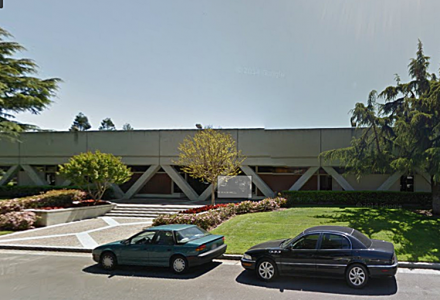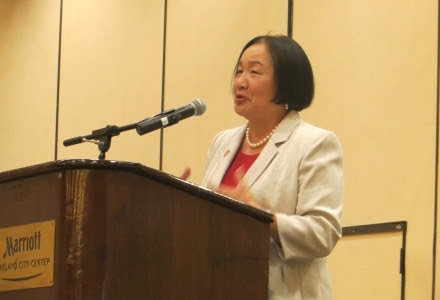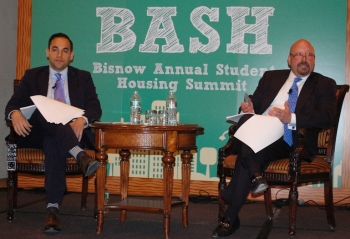|
Hall Structured Finance is a direct lender providing financing, including debtor-in-possession and note purchase financing, offering flexible structures and terms. Click here. Sources tell us that HCL Technologies is eying the Phoenix metro for a potential HQ relocation from California. (Cheap flights and people with allergies aren't the only things that move from California to Phoenix.)  Initially, the company could take about 60k SF of prime office space here, but it could eventually encompass as much as 200k SF, sources knowledgeable of the deal tell us. Among economic and real estate pros, the deal is more commonly known by the moniker “Project Nightingale" (or that's the name of the next Hunger Games book) and it's being handled by JLL's Phoenix office. Officials with JLL did not return calls seeking comment. And HCL's Meenakshi Benjwal also declined to comment on “rumor and speculation.” If the deal comes to fruition, it will be a big win with the metro area's economic development ambitions. And HCL is not a stranger to Phoenix. According to press reports, in 2008, Grand Canyon University launched an MBA program directed at HCL's top executives at its India home base. While he declined to comment on HCL, Greater Phoenix Economic Council's Chris Camacho recently told our audience of more than 200 CRE pros at the Phoenix State of the Market that Phoenix is seeing a resurgence in economic development activity, particularly with financial services firms and with technical jobs. “This is no longer really just a popular call center market,” Chris says. |
 |
As Mulhern Sees ItAs some of you know, we got the grand tour of Phoenix. Our intrepid reporter Jarred Schenke visited with many of you, and for the next few weeks, we'll be featuring those interviews. First on our list is Colliers International's Bob Mulhern, one of Phoenix's CRE vets, who began the life in 1983 with Charlie Keating, a SoCal and Phoenix developer. “He was the kind of employer who really threw you into whatever he was involved with,” Bob says. After stints with CBRE, Ryan Cos, and Reliance Cos, Bob joined Colliers in 2009 just as development overall was shutting down due to recession.  And with nine children ranging in age from 24-years-old to 21-months-old (“So I have a son in diapers and another one is in New Zealand seeing the world”), he took on the managing director role at Colliers. About the economy: “We clearly have momentum… much more significant activity than we had a year ago,” he says. “What we don't have yet is as many jobs in the market as we had in 2008 and 2009.” Certainly the deals his firm has done over the past year demonstrate development momentum: Kansas City Life's spec projects in West Valley, GCU's Eastmark 100-plus acre site, and working on a spec mixed-use development with Rockefeller Group (pictured above) in the East Valley. |
 |
Cloak-And-Dagger |
||
 We chatted up with Cushman & Wakefield's Greg Valladao and Jim Wilson, still glowing from their mega Apple deal here in the former First Solar facility taken by a mysterious blogster known as the Apple Insider. The duo remembers how the deal started with a simple phone call that led to a tour with a mystery group of engineers. The deal then went fast—all along neither Greg nor Jim knew what company they were dealing with. (Who says spies have all the fun?) All in all, 30 days. |
And it was Greg (on right with Jim) who recognized the secret identity—as a former Apple employee, he says he recognized the address from where the $5M closing check was processed, and told Jim it looked as if Apple was the company behind the mystery. “Apple was fun because it was all a little cloak-and-daggerish,” Jim says. Greg ditched a career as a lawyer to be in the biz. After winning his second trial, his client complained about billing. At the same time, he noticed his uncle in the business going to a closing celebration at a restaurant. “The whole idea of an industry where you can do something where both parties were pleased with how it ended sounded like an industry I wanted to be in. It certainly wasn't in the legal profession.” |
|
 |
We Got Your MayorsBisnow has been busting out the mayors for you: Our recent Oakland, Baltimore, and Denver State of the Market summits were all keynoted by the local head honchos. (Plural: Hizzonii?) Above, Denver Mayor Michael Hancock highlighted how his city is one of the premier growth markets. The crowd of 350 agreed, saying the Denver commercial real estate economy is back to a 7 or 8 (with 2007 being a 10 and 2009 being a 1).  400 attendees saw Oakland Mayor Jean Quan flaunt her city's titles: Top turnaround city, home to the fastest-selling homes in the US, and No. 5 best city for attracting VC. She's particularly proud of Oakland's international prowess, noting the $1.5B Chinese investment for the Brooklyn Basin project—a signature property on the water. The restaurant scene isn't too bad either; "If you're a foodie like me,” she says, this is the place to be. (We'll just have to do extensive research on that and get back to you.) Baltimore Mayor Stephanie Rawlings-Blake celebrated progress toward her goal of 10,000 new families in the city: 4,200 housing units have been created in Baltimore City since 2010, and 3,700 are in the pipeline. (So tell your kids to move out already.) Apartment development and conversion incentives should keep the momentum going, but a city can't grow unless the people who already live there have a reason to stay. Hers: She'll continue to cut residential property taxes; the City is issuing RFPs for City-owned properties in the Bromo Arts District; and her administration has $1.1B lined up for school construction. |
 |
Live from BASH! |
||
 If you've been biting your nails over the state of higher education, stop. American Campus Communities CEO Bill Bayless told a crowd of 400 yesterday afternoon at the Bisnow's national Annual Student Housing Summit (BASH) in Philadelphia that there's been a lot of misinformation in the media, but if you drill down, “the fundamentals are fantastic.” (We snapped him, right, with MSC University VP Matthew Stein, who moderated the keynote.) Even though we're at the end of the Echo Boomer age, there are more 18- to 24-year-olds going to college than ever, he says, leading to stable, growing enrollment, particularly at Tier 1 schools. Even Moody's says higher ed remains a valuable, long-term investment, which means more opportunity for real estate. |
 ACC's formula for success, according to Bill: proximity to campus, a differentiated product, and entering markets with high barriers to entry. (Not to mention school pride: He's donning a Drexel tie.) Student housing developers continue to make the mistake of overbuilding at a price point, which Bill's seeing in college towns across the US. Another: not having the right mix of retail at a project, leading to empty space. “Every bad deal takes three good deals to make up for it,” he says. Overall, the 18-to-24 set is innovative, tech-oriented, and on the cutting edge, so they demand good technology and access. “If they can't use their smartphone in your building, they'll move elsewhere,” he says. They're also more health conscious, so kitchens and in-building fitness centers are also attractive. |
|
 |





